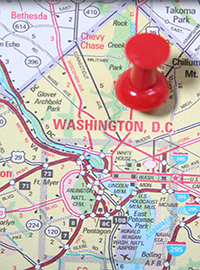| Next Election Could Decide If Washington, D.C., Becomes 51st State |
 |
|
By Byron York
Wednesday, July 01 2020 |
The drive to make Washington, D.C., a state has been a favorite of some Democrats for years. Why wouldn't it be? If enacted, a new state, formed from deepest-blue D.C., would create two new Democratic senators and one new Democratic member of the House. For a Democrat, what's not to like? But while there have been lots of D.C. statehood bills over the years, the issue has been voted on only once before. In 1993, it failed badly in the House, losing 277 to 153. Back then, moderate Democrats put their judgment before partisan interest, splitting on whether statehood was really necessary. Democratic stalwart Rep. John Dingell, for example, opposed it, saying if residents of the District of Columbia didn't like where they lived, they could "leave any time they want." But times have changed. Pro-statehood leaders have portrayed statehood as a civil rights issue. That's not new, but it is particularly resonant for Democrats with Black Lives Matter protests going on around the country. So recently, when House Speaker Nancy Pelosi put statehood to its second-ever vote, the measure passed with almost every Democrat voting for it. (The lone exception was Minnesota moderate Rep. Colin Peterson.) Every Republican voted against it. That's where things stand until the Republican-controlled Senate stops it cold. "This is not just an issue of local governance and fairness," House No. 2 Democrat Steny Hoyer said. "It is a major civil rights issue as well." The name of the proposed new state would be the State of Washington, Douglass Commonwealth, for the former slave and famous abolitionist Frederick Douglass. Some supporters' rhetoric got far more heated. "Residents in our nation's capital cannot be who we dream to be because Republicans in Congress won't get their knees off our necks," wrote longtime Washington Post columnist Colbert King. If passed, D.C. statehood would be a complicated affair. The Constitution specifically calls for a seat of national government that is not part of any state and that is under the complete jurisdiction of Congress. Its residents have the right to vote for president – that was granted in the 1960s – but not for a voting representative in either the House or the Senate. The original 100-miles-square District of Columbia was taken from Maryland and Virginia and straddled the Potomac River. Many Virginians were not happy about it. In 1846, Congress returned the part south and west of the Potomac to Virginia. That was known as "retrocession." Now, some suggest that if residents of the district want full voting representation, they should do the same thing with Maryland – that is, shrink the current District of Columbia down to the bare-bones federal areas and return the rest to Maryland. That way, residents of the largest part of D.C. would become residents of Maryland and have full voting rights and representation. The much smaller remaining District of Columbia would cover mostly the White House, the Mall, federal buildings and the Capitol. It would be complicated, but it has been done before with Virginia. But D.C. statehood advocates don't want it. Why? Because retrocession to Maryland would not create a new state with two new Democratic senators and one new Democratic representative. If Democratic statehood advocates were concerned only with winning full voting rights for district residents, they would be open to supporting retrocession. There is a precedent, and the voting-rights argument would be untainted by partisan motive. No, D.C. Mayor Muriel Bowser would not become Gov. Bowser, as she would in the Democrats' bill, but hundreds of thousands of district residents, the vast majority of them Democrats, would win the right to elect voting representatives in the House and Senate in their new home state of Maryland. Instead, under the House Democrats' plan, a new state would be created, with an entire state government and those two new senators and one new representative. A lot of Republicans dismiss the statehood effort as impossible. It will never pass in the Senate, they say. And it won't – for now, at least. But what if a Democrat is elected to the White House this November, and the party wins a majority in the Senate, while keeping the House? All that will stand in the way of D.C. statehood becoming law is a Republican filibuster in the Senate. And then, there is a good bet that Senate Democrats will use the nuclear option to kill the legislative filibuster. If that happens, D.C. statehood could become a reality. Byron York is chief political correspondent for The Washington Examiner. |
Related Articles : |
























